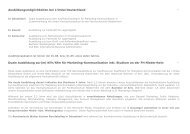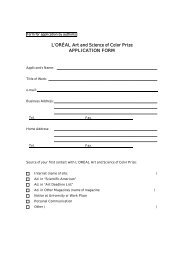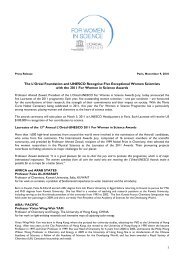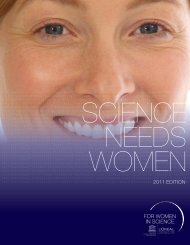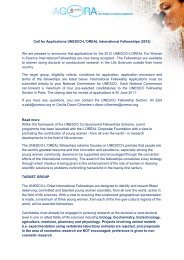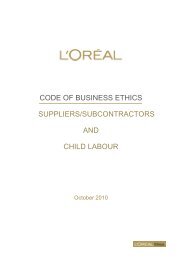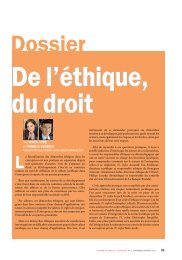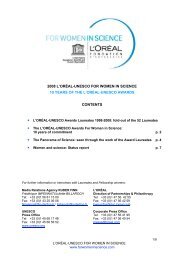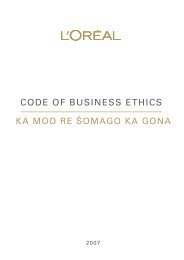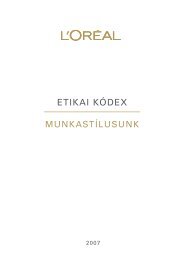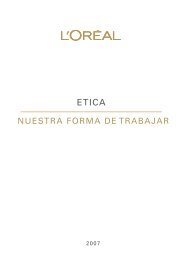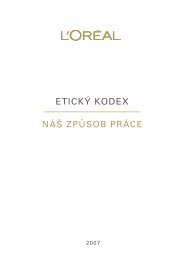CONTENTS - L'Oréal
CONTENTS - L'Oréal
CONTENTS - L'Oréal
You also want an ePaper? Increase the reach of your titles
YUMPU automatically turns print PDFs into web optimized ePapers that Google loves.
There is no difference between men and<br />
women when it comes to studying science<br />
“When I was young, everyone used to say that science<br />
was difficult for men, and impossibly difficult for women.<br />
Only men were supposed to be any good at calculus, and<br />
the only goal for a woman was to get married and have a<br />
family. Since I enjoyed mathematics, physics and science<br />
in general, I wanted to show that there was no difference<br />
of ability between men and women, and to demonstrate<br />
to the world that I could work in science. I dreamed of<br />
having the same status in the scientific community as<br />
men. I did my primary schooling, in the 1950s, in cities<br />
(Mahdia and Jemmal) where the highest diploma women<br />
obtained was the Certificate of Primary Studies<br />
(Certificat d’études primaires), and none of the girls I was<br />
with obtained it. There were very few girls in my primary<br />
school: about 25 of us in the first year, but only 6 made it<br />
to the final year. In those days, girls went to school for<br />
three, four or maybe five years, and then got married at<br />
the age of 15. No girl thought of going on to secondary<br />
school. That meant going to another city. For me the nearest<br />
city was Sousse, which was 25 kilometers away, and that<br />
was quite a trip when there were no buses or cars.”<br />
A scientific awakening<br />
L’ORÉAL-UNESCO FOR WOMEN IN SCIENCE 2005<br />
L’ORÉAL-UNESCO AWARDS 2005: The Laureates<br />
“When Tunisia became independent in 1956 my family<br />
moved to Tunis, where I spent six years in a secondary<br />
school which was very good for French and Arabic but<br />
unfortunately not very good for the sciences. After<br />
independence, education became the Tunisian<br />
Government’s main concern, and in 1963, with my<br />
baccalauréat in mathematics, I went to the University of<br />
Tunis’s newly built Science Faculty. We were 200<br />
students, but only five of us were girls. At the time, for<br />
example, Tunisia did not have a single female engineer.<br />
Luckily for me, my family gave me their backing, clearly<br />
judging that any choice I had made was an act of will, and<br />
therefore good.<br />
“At the end of June every year a university professor<br />
would come from France to supervise our examinations.<br />
The Government would award fellowships to the best<br />
students - three, four or five a year - so that they could<br />
pursue engineering studies or do fundamental research<br />
in France. In 1967 I was nominated by the president of<br />
the jury and given the chance of studying for a Diploma of<br />
Further Studies (Diplôme d’études approfondies, DEA) in<br />
atomic spectroscopy in Paris; later I returned to earn a<br />
doctorate. Every Tuesday I would go to the Collège de<br />
France to attend lectures on quantum mechanics by<br />
Claude Cohen-Tannoudgi. He was a great teacher, who<br />
would guide you step by step into the world of the atom.<br />
Atomic physics seemed crystal clear when you listened to<br />
him! Abdus Salam was another Nobel laureate I<br />
admired. It was he who created the International Centre<br />
for Theoretical Physics in Trieste, Italy, where research<br />
physicists from developing countries can study alongside<br />
fellow scientists in a stimulating atmosphere and<br />
with the use of a well-resourced library. Travel and<br />
accommodation are provided. My husband - who is also a<br />
physicist - and I both had job offers in France, and were<br />
tempted to continue our careers there, but we chose to<br />
return to our country in spite of the fact that it lacked a<br />
scientific environment. It was hard, but we do not regret<br />
our decision. One has to be where one is most useful. At<br />
each stage in my career my mother would say, ‘Yayia el<br />
Elm’ (‘Science be praised’).”



